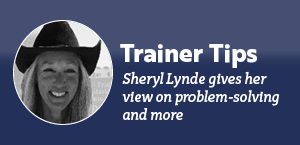By Sheryl Lynde | Horsetrader columnist

In December’s article I pointed out the human tendency to shy away from situations of uncertain outcomes. In his book “Think like a Rocket Scientist,” author Ozan Varol states “our obsession with uncertainty leads us astray; all progress takes place in uncertain conditions.”
When we place the horse in unfamiliar situations, holes in their training are uncovered. We are able to focus our efforts on their areas of weaknesses. Similarly, human character flaws are also revealed when the heat is on. It is when we are tested that opportunities present themselves to get better, be better, go deeper.
Conversely, there is a process that offers a definite, guaranteed outcome, but we spend vast amounts of money each year to fight this process, to deny and conceal it — everything but accept it. However, we can’t escape the inescapable. It’s called age.
Meaningful work is a crucial ingredient to the pursuit of fulfillment at any age. Our bodies may slow down, but our minds still yearn for engagement. The parallel is easily recognized in our equine partners as well.
My gelding, now 25, has been my companion since he was four. He has been instrumental in my career, giving demonstrations, helping me start difficult colts and problem horses. Each time I would enter his pasture to halter him, I’d say “I need your help, buddy.” And when we completed our job for the day, as I turned him loose, I let him know I couldn’t have done it without him.
Joe hasn’t taken a lame step in his life. This year I started my last colt. Again, his even temperament was like a balm to this youngster, and Joe was of great service setting the tone for this colt and hundreds of others before him. When the colt left, I noticed a huge change in Joe within a short month or two. He started to favor a knee and he began to hobble around in his pen. His eye changed. He began to look his age.
He has had consistent exercise all of his life, and within just a couple of months of limited activity, even though he is in a larger pen with two other geldings, I noticed a difference in his overall well being.
After consulting with my vet, Dr. Wayne McNeel regarding Joe’s knee, he directed me to the appropriate medication that would make him more comfortable, and it did. That was addressing his physical needs; now, for his mind.
Wayne shared with me a study that was performed by Penn State. They took two groups of horses, one group they gave joint supplements and the other group they regularly exercised over a period of time. Then they switched groups. In both cases, the group that received regular exercise improved and moved more fluidly than the group on the supplements. Regular exercise is key to their well-being. It can even be said that it reduces the risk of colic, especially if they are in a smaller stall. An effective workout regime for Joe with limited signs of lameness would be 30 minutes at a walk or trot, five days a week, avoiding hills. I also have a horse with navicular. His condition is closely managed, but there are times when he does favor his affected foot. As suggested by Wayne, I saddle up both Joe and my other gelding. I ride Joe and pony the other for 30 minutes, and then I switch for the ride back. Wayne has clients that give regular lessons on their older horses who are in their 30s. The key is consistent exercise that is a match for their age and physical ability. It also works their mind; they still need mental stimulation.
For the horse that has suffered a more debilitating injury or illness that prevents activity, just making them as comfortable as possible is key. Make sure they aren’t in a pasture situation where they get picked on and can’t protect themselves. When you find them lying down more often, not wanting to stand or off their feed, you may have a difficult but kind decision to make.
If you can’t provide the care for your older horse, take the time to find the appropriate home. Rescues are not always the answer. They need to be thoroughly vetted — go out and physically pay a call to the facility. Some are hoarders and most are full and all are in need of donations. One could provide a good home with proper care, but do your homework and contribute if possible.
Some owners provide for their horses by designating funds for their care in their wills. This gives them tremendous peace of mind, preparing as best they can for the inevitable.
Couldn’t we all use a little peace of mind?
–Sheryl
Leave a Comment
All fields must be filled in to leave a message.